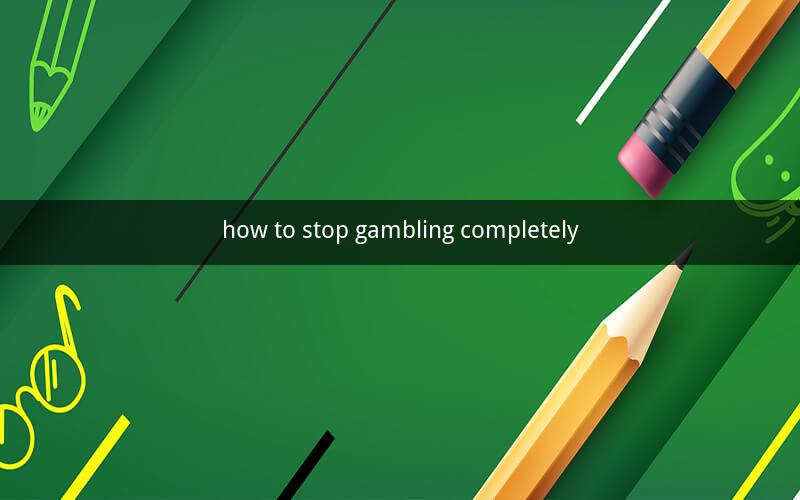
Table of Contents
1. Introduction to Gambling
2. Understanding the Reasons Behind Gambling
3. Identifying the Signs of Problem Gambling
4. Seeking Professional Help
5. Building a Support System
6. Developing a Personalized Plan
7. Techniques to Curb Cravings
8. Learning to Manage Stress
9. Celebrating Progress and Staying Motivated
10. Conclusion
1. Introduction to Gambling
Gambling, an activity that has been around for centuries, is a form of entertainment that involves risking money or valuable possessions on an uncertain event. While many individuals enjoy gambling as a leisure activity, for some, it can become an addiction, leading to significant financial, emotional, and social problems. This article aims to provide valuable insights on how to stop gambling completely, offering practical tips and strategies for those struggling with this issue.
2. Understanding the Reasons Behind Gambling
To effectively address the problem of gambling addiction, it is crucial to understand the underlying reasons that drive individuals to engage in this behavior. Common reasons include seeking excitement, escape from reality, coping with stress, and the allure of potential financial gains. By acknowledging these factors, individuals can take the first step towards overcoming their addiction.
3. Identifying the Signs of Problem Gambling
Recognizing the signs of problem gambling is essential for taking action. Common indicators include:
- Spending more time and money on gambling activities than intended
- Feeling restless or irritable when unable to gamble
- Borrowing money to finance gambling habits
- Neglecting personal, professional, or family responsibilities due to gambling
- Experiencing mood swings or other emotional disturbances as a result of gambling
4. Seeking Professional Help
If you or someone you know is struggling with gambling addiction, seeking professional help is crucial. Therapists, counselors, and addiction specialists can provide personalized guidance and support. Various treatment options are available, including individual therapy, group therapy, and residential programs.
5. Building a Support System
A strong support system is essential for overcoming gambling addiction. This can include friends, family, support groups, or even online communities. Surrounding yourself with individuals who understand and support your journey can significantly improve your chances of success.
6. Developing a Personalized Plan
Creating a personalized plan to stop gambling is a vital step in overcoming addiction. This plan should include:
- Setting clear goals and expectations
- Identifying triggers and developing coping strategies
- Establishing a budget and avoiding high-risk situations
- Monitoring progress and adjusting the plan as needed
7. Techniques to Curb Cravings
Curbings cravings for gambling can be challenging but is essential for long-term recovery. Here are some techniques to help manage these cravings:
- Engage in alternative activities that provide similar thrills, such as sports, hobbies, or exercise
- Practice mindfulness and relaxation techniques, such as meditation or deep breathing exercises
- Reach out to your support system when cravings become overwhelming
8. Learning to Manage Stress
Stress can be a significant trigger for gambling addiction. Learning to manage stress in healthy ways is crucial for maintaining your sobriety. Consider the following strategies:
- Practice stress-reducing techniques, such as yoga, tai chi, or journaling
- Develop healthy coping mechanisms, such as exercise, hobbies, or spending time with loved ones
- Seek professional help if stress becomes overwhelming
9. Celebrating Progress and Staying Motivated
Recognizing and celebrating your progress is essential for maintaining motivation. Take time to acknowledge your achievements, no matter how small. Celebrate milestones, and remind yourself of the reasons you started this journey.
10. Conclusion
Stopping gambling completely requires dedication, patience, and perseverance. By understanding the underlying reasons for your addiction, seeking professional help, building a support system, and developing a personalized plan, you can overcome your gambling addiction and reclaim your life.
Questions and Answers
1. What is the most effective way to stop gambling completely?
- The most effective way to stop gambling completely is to combine professional help, a strong support system, and a personalized plan tailored to your specific needs.
2. Can I overcome gambling addiction on my own?
- While it is possible to overcome gambling addiction on your own, seeking professional help and joining a support group can significantly improve your chances of success.
3. How long does it take to stop gambling completely?
- The time it takes to stop gambling completely varies from person to person. Some may experience immediate results, while others may need several months or even years to fully recover.
4. Can stress lead to a relapse in gambling addiction?
- Yes, stress can be a significant trigger for relapse in gambling addiction. Learning to manage stress in healthy ways is crucial for maintaining sobriety.
5. Are there any medications available to help with gambling addiction?
- While there are no medications specifically designed to treat gambling addiction, some medications may be prescribed to address underlying mental health issues, such as depression or anxiety.
6. How can I find a reputable therapist or counselor to help me with my gambling addiction?
- To find a reputable therapist or counselor, consider seeking recommendations from your healthcare provider, support groups, or professional organizations dedicated to addiction treatment.
7. Can I still enjoy gambling in moderation after overcoming my addiction?
- After overcoming gambling addiction, it is essential to remain vigilant and avoid any activities that may trigger a relapse. Enjoying gambling in moderation is not recommended.
8. How can I stay motivated during my recovery journey?
- Staying motivated during your recovery journey involves celebrating progress, setting realistic goals, and reminding yourself of the reasons you started this journey.
9. Can my family members or friends participate in my recovery process?
- Yes, family members and friends can play an active role in your recovery process by providing support, attending support group meetings, and learning about gambling addiction.
10. What should I do if I relapse?
- If you experience a relapse, it is essential to acknowledge it, learn from it, and seek help immediately. Reconnect with your support system, consider revising your recovery plan, and continue your journey towards sobriety.